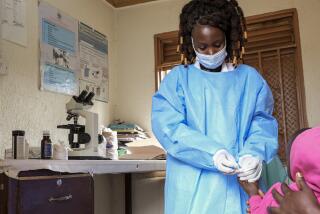African Nations Shun AIDs Research, Reports
Did AIDS originate in Africa? Many leading scientists think so, but the hypothesis is still cloaked in clouds of mystery--abundant circumstantial evidence but still no convincing proof.
Many African governments, on the other hand, steadfastly deny that the disease even exists within their boundaries, let alone that it may have rooted there before spreading around the world.
The discrepancy between the two views has set the stage for the kind of conflict that can arise, not only when scientists disagree with one another, but when politicians disagree with those scientists.
The results of studies presented last week in Brussels at an international conference on AIDS in Africa added heavy evidence that the disease is spreading at a frightening rate in certain parts of the continent.
AIDS, it is true, is not found all over Africa. The focal point is Central Africa, notably Zaire, Rwanda, Burundi and Uganda. But the disease appears to be spreading to Kenya and some of the countries farther south, including South Africa, although as yet the concentration of cases there is relatively light.
Before the Brussels session began, several African nations were reportedly incensed by the publicity associating AIDS with Africa and cancelled their scheduled speakers. Aware of the sensitive nature of the subject, the rector of the University of Brussels, H. Hasquin, warned researchers about referring to AIDS in Africa:
“We should be careful not to awaken the demon of racialism,” he said, warning that it could become an added burden to the ostracism already suffered by AIDS patients.
But the highly respected Dr. Robin Weiss, from the Chester Beatty Laboratories in London, told the gathering--about 700 scientists from 51 nations, including 50 from 16 African countries--that “AIDS is a spreading disease that has become pandemic in much of tropical Africa.
“Any countries that hope by ignoring AIDS that it will go away, put their own people to hostage and suffering,” he said. “If a country is concerned about the public health of its people, it cannot pretend that AIDS is not here.”
Dr. Nathan Clumeck, a pioneer Belgian AIDS researcher who helped diagnose some of the earliest detected cases from Africa, told the assemblage that nobody would know there is an epidemic in Africa, to judge from the reports of the World Health Organization. The reason: Many African countries have not been reporting AIDS to the world organization. He cited statistics indicating that incidences of cases in Kinshasa, Zaire, approach those of the hardest-hit American cities, although unlike here, the majority of victims are heterosexual rather than homosexual.
But Clumeck’s zeal to get at the truth cooled considerably toward the end of the conference, possibly because in the interim, African doctors in attendance had held a meeting of their own. Later, at a news conference flanked by two African physicians--one from Zaire, the other from Uganda--Clumeck declined to discuss any report strongly indicating that AIDS is a problem in Africa.
The reason, it soon became apparent, was that all European and American scientists who wish to do AIDS research in Africa must avoid angering prospective host governments. If that country is convinced that AIDS is not a significant problem, too much talk about “the African AIDS problem” could jeopardize any invitation to work there.
This means that researchers doing needed epidemiological and other scientific studies in Africa--already too few in number--are at the mercy of governments that often tolerate their efforts reluctantly, and that may use any excuse not to cooperate, or even to expel them.
Researchers must now decide whether the potential benefits of any findings that can be made under such circumstances are worth more than can be gained in studies elsewhere.
Officials in most Central African countries have clamped a tight lid on the news media’s access to AIDS researchers within their borders. “We don’t want any reporters coming to Zaire to report on AIDS,” an official of the Ministry of Health told a reporter last April at a Centers for Disease Control conference in Atlanta. Other African countries have also turned down news-media requests.
The pursuit of knowledge is difficult in an environment of suspicion. Understandably, African nations do not want to be identified as the place where AIDS originated. But if, in fact, this is the case, scientists are convinced that the information would have great value for understanding the virus--a virus that must be controlled if the worldwide epidemic is to be contained.
More to Read
Sign up for Essential California
The most important California stories and recommendations in your inbox every morning.
You may occasionally receive promotional content from the Los Angeles Times.










